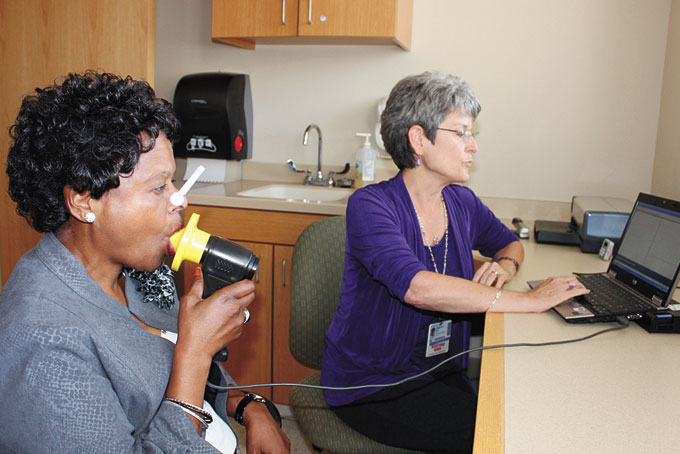
DEEP BREATH—Catherine Vitari gives Jackie Dixon a spirometry test.
According to the U.S. Department of Health and Human Services Office of Minority Health, Blacks were 20 percent more likely to have asthma than Whites in 2011. Additionally, in 2009, Blacks were three times more likely to die from asthma related causes than Whites.
The University of Pittsburgh Asthma Institute at UPMC is working to reduce these disparities through a series of clinical studies. This research will help them determine why African-Americans are disproportionately afflicted with asthma and help them develop better methods of treatment.
“Our goal is to improve the care of asthma patients throughout the region,” said Dr. Sally Wenzel, director of the Asthma Institute. “We are in the process of doing two clinical studies. One is a specific study to address asthma disparities in African-Americans. It’s a very common disease among African-Americans.”
The Asthma Institute was founded in 2009 to increase the scientific understanding of asthma and allergic diseases and implement innovative approaches in the community.
ASTHMA INSTITUTE—From left: Jackie Dixon, Sally Wenzel, Research Coordinator Mary Fisher, Fernando Holguin, and Catherine Vitari, research clinical nurse manager.
In order for their research to be successful, the Asthma Institute must recruit a number of participants. In order to increase the number of African-American participants, who are traditionally underrepresented in clinical studies, they recruited Jackie Dixon, retired Giant Eagle director of government relations, to help with community outreach.
“I’ve been introducing them to the community,” Dixon said. “I’ve just seen too many people receive poor treatment. What drew me to this organization is their dedication and commitment.”
Together they have begun attending church and health events where they answer questions about asthma, perform free breathing tests and provide information on how participants can volunteer to be a part of a clinical study.
“We’re seeking a variety of levels of involvement,” Wenzel said. “The first step is just increasing awareness that asthma is a problem in the African-American community.”
CHECK UP—Fernando Holguin checks Jackie Dixon’s breathing. (Photos by J.L. Martello)
The Office of Minority Health has also found Black children are 3.6 times more likely than White children to visit the emergency room for asthma. From 2003 to 2005, Black children were seven times more likely to die from asthma related causes than White children.
“One of the examples we found talking to mothers with children, when you ask them how their kids are doing, they’ll say fine because their kids haven’t been to the emergency room,” said Dr. Fernando Holguin, assistant director of the Asthma Institute.
Asthma is thought to be more dangerous for African-Americans because of unequal health access, under treatment, income differences and environmental factors such as allergies and stress. Researchers have also been looking into genetics as a factor.
“It’s a major public health problem that requires a multi-layered approach. I’ve personally seen a lot of people struggle when they shouldn’t have to,” Holguin said. “What we’re trying to do is work with the community as equal partners.”
The Asthma Institute is looking for study participants between the ages of 18 and 75 who are non-smokers and have been diagnosed with asthma. They are also working on other pediatric studies for participants under 18.
(For more information on the Asthma Institute visit www.asthmainstitute.pitt.edu.)
Your comments are welcome.
Follow @NewPghCourier on Twitter https://twitter.com/NewPghCourier
Like us at https://www.facebook.com/pages/New-Pittsburgh-Courier/143866755628836?ref=hl
Download our mobile app at https://www.appshopper.com/news/new-pittsburgh-courier